- Home
- Jude Hardin
A Time for Dying Page 2
A Time for Dying Read online
Page 2
And of course I would be a corpse in a casket by then.
Crouched behind the engine compartment of his car, the fat little cop drew his pistol and aimed it at the door to Rutherford’s office.
“Come out with your hands behind your head,” he shouted.
I had two choices: I could surrender, or I could make a run for it.
If I gave myself up, I would die for sure. In a jail cell.
So there was really only one choice.
I yanked the door open and darted out to the right, ignoring the string of expletives that followed the officer’s command for me to freeze. I turned the corner, sprinted a hundred feet or so to the chain link barrier that separated Rutherford’s building from the alley behind it.
I was pretty agile for a ninety-nine-year-old man, but it had been a long time since I’d climbed a fence. Amped on adrenaline, I grabbed the top and heaved myself up, swinging my leg around and hooking my foot on the rail, pushing myself over and rolling onto the asphalt on the other side.
I scrambled to my feet, took off down the alley galloping like a madman, the way you might run if some sort of wild beast was chasing you. A lion or a tiger or something. I didn’t look back, but I could hear the policeman’s footsteps behind me. I could hear them, and they were getting closer. He was gaining on me, somehow, even though his legs were short and his belly was enormous.
He was probably about seventy years younger than me, about my wife’s age, so it made sense that he was faster. What didn’t make sense, to me at least, was what happened next.
4
Two strong and angry hands grabbed my shoulders, pulled me backward and threw me to the pavement.
“You don’t understand,” I said, rolling onto my back, trying to catch my breath. “If I don’t find William B. Rutherford by eleven-thirty tonight—”
A hot blue arc of excruciating pain sped from one end of my nervous system to the other, shooting through me like a pressurized injection of boiling seltzer, scalding my brain and my toenails and every micrometer of flesh in between. It felt as though I had been cut in half with a razor and dipped into a vat of molten lead.
I curled into a fetal position and moaned, every muscle in my body twitching with raw painful spasms.
“Try to get up and I’ll hit you with it again,” the cop shouted.
“You’re kidding, right? I couldn’t get up right now if my life depended on it. Which it does, if you want to know the truth.”
“Why did you run?”
I told him about the letter, the time and money exchange, everything.
“If you take me to jail, I’m going to die tonight at eleven-thirty. Let me go, and I might have a chance.”
He stood there and stared down at me for a few seconds, his eyes unreadable behind a pair of mirrored sunglasses.
“You got any weapons on you?” he said.
“No.”
“What about in the car?”
“There’s a knife under the seat.”
“What kind of knife?”
“Survival,” I said. “It’s in a sheath. Totally legal.”
“You don’t need to tell me what’s legal and what’s not legal. Why should I let you go? What’s in it for me?”
Was I hearing this guy right? Was it possible that he was open to a bribe?
The penalty for that kind of thing was severe, on both ends, but it wasn’t like I had a ton of options at the moment.
“I’ll give you a million dollars to let me walk away,” I said. “There’s a phone in Rutherford’s office. We can go back there and do the transfer right now.”
And so we did. He was skeptical at first, handcuffing me and threatening to zap me with the Taser again if I tried to run, but everything went smoothly once he heard my bank account balance over the phone.
12:41:29…12:41:28…12:41:27…
I climbed into my car, steered to the exit and took a right. The cop followed me for a couple of blocks and then made a U-turn. It had been his lucky day. He was a millionaire now, and all he had to do was look the other way on a simple breaking and entering. What did he care? There wasn’t anything in the office worth stealing anyway. It wasn’t like he’d let a murderer go, or a drug dealer or something.
Although it was possible that he had let a murderer go, because I planned to kill William B. Rutherford if he didn’t give me my hour back.
But first I had to find him.
I had a friend who worked at the Department of Motor Vehicles, and I figured that would be a good place to start. If Rutherford had a car registered in his own name, the DMV would have his home address on file.
I drove over there and waited for Jimmy to go on break. He ferreted through some files, ran off a copy, slipped it to me discreetly over the counter.
“If you get in trouble, I don’t want my name coming up,” he said.
“Don’t worry, man. If things go my way, I’ll give you enough money to retire from this crummy gig. If things don’t go my way, I’ll be dead.”
“Good luck.”
“Thanks. I’ll need it.”
If Rutherford had left the continental United States last night, there probably wasn’t anything I could do. There just wasn’t enough time. I was toast, as we used to say in a decade I barely remember. But I had a hunch Rutherford was still in town, or at least somewhere nearby. He’d done a really nasty thing, and I was almost certain he’d broken some kind of law. He wouldn’t have wanted to arouse suspicion by traveling abroad after making such a large transfer of funds. Chairman L’s International Bureau of Investigations kept an eye on things like that, and you didn’t want to mess around with those guys. They didn’t carry Tasers, and they didn’t take bribes. They could make you disappear in a heartbeat, no matter how much time you had on your chip. No questions asked.
I took the interstate north, got off on River Road, veered right at Webster’s Park and followed the winding two-lane up to a gated community called Whispering Oaks. Rutherford’s house was on a cul-de-sac, two-story red brick with a black roof.
There was a real estate sign in the yard.
OPEN HOUSE, FEBRUARY 13 AND 14, 2PM TO 4PM
I parked my car, killed the engine, climbed out and walked up the drive. It was still a little early for the open house, but there was a Cadillac up there with magnetic signs on the doors, same real estate company as the sign out front. The agent was in the house, and I was hoping that William B. Rutherford was too.
I stepped up onto the porch, used the fancy brass knocker, and a few seconds later a woman wearing a cranberry business suit answered. Her nametag said Kiki. Nice makeup, decent dye job. She could have been forty, or she could have been ninety. With Gen-41, it was hard to tell.
“I’m sorry, but we’re not quite ready yet,” she said.
“How much is the house?”
“Excuse me?”
“How much money does the owner want? What’s the asking price?”
She gave me a you’ll-never-be-able-to-afford-it look, but then she went into salesperson mode anyway. Just couldn’t help herself.
“This property went on the market yesterday,” she said. “And I can tell you right now that it won’t last long. Six bedrooms, four and a half baths, two wood burning fireplaces—”
“How much?”
“It’s listed at two-point-four, but of course that’s just a starting price.”
“I’ll take it,” I said. “Is the owner here?”
“Sir?”
“I want the house. I’ll pay for it right now. Cash. There’s only one stipulation. We have to close on the property today.”
She took a deep breath. “Today?”
“That’s right. So get the papers together. I’ll come in and sit down with the owner and we’ll get this thing done.”
“Have you ever bought a house before, sir? That’s just not how it works. We can’t close on it today. You can put an offer in, and I can take that offer to the owner, and if he accepts it—”
“I’m offering two point four million dollars, but only if I can sit down with the owner today. Right now. We can at least get started on the paperwork, right?”
“Actually, the owner isn’t here, and he doesn’t want to be disturbed. At least until tomorrow. Those were the instructions he left, and I feel compelled to honor them.”
“I’m sure you do. But don’t you think the owner might be just a little perturbed when he finds out that you had a cash offer on the house? Surely that doesn’t happen every day.”
“Regardless, he was very specific about not wanting to be bothered while he was out on his boat today.”
“He has a boat?” I said.
“I probably shouldn’t have mentioned that. Anyway, if you want to come inside, we can go ahead and write up the offer. I’ll remove the open house tag on the sign out front and replace it with one that says sale pending.”
“Okay. If that’s the best you can do.”
“Great. Come on in.”
I stepped over the threshold. When Kiki closed the door, I grabbed her by the arms and wrestled her to the exquisite Persian rug covering the hardwood planks in the foyer. She screamed, but the house was well insulated, and there weren’t any neighbors close enough to hear her.
“Where’s the boat?” I said.
“Let me go, you son of a—”
“Tell me where the boat is, and I’ll let you go. Don’t tell me, and I’ll kill you. Your choice. You have five seconds. One, two, three, four—”
“All right! It’s on the lake.”
“Arrowhead?”
“Yes.”
“Del Ray?”
“Yes. Please don’t hurt me. I’m just trying to do my job.”
She started sobbing.
“I’m not going to hurt you,” I said. “But I’m going to have to tie you up. I don’t have time to bribe any more police officers.”
“What?”
“Never mind.”
I didn’t have time for any more cops, and I didn’t want her calling Rutherford and telling him I was coming. I wanted it to be a surprise.
I used a pillowcase to gag her and some lamp cords to bind her wrists and ankles. If things went my way, I planned to come back and make her rich before the day was over.
Before climbing into my car and heading for the lake, I walked out to the yard and pulled the real estate sign out of the ground.
Open house was cancelled.
5
It was almost four o’clock by the time I made it out to Arrowhead.
I had less than eight hours to live.
On the way out there, I’d reflected on some of the remarkable things that had happened during my lifetime.
JFK.
First man on the moon.
9/11.
The war.
Chairman L.
At one point, I started thinking that maybe a hundred years was enough. I could remember a time when hardly anyone lived that long, and those who did were often in pretty bad shape by the time they finally let go. I’d thought about turning around and spending my last few hours with Brenda, the way we’d planned. Dinner at our favorite restaurant, champagne, nice hotel room with a view of the river. We would make love one last time, and then we would hold each other until the end. I would insist that she remarry, and she would lie and say that there would never be another.
Or maybe it wouldn’t be a lie. Maybe she would believe the words as she said them, but there would be others, at least one more, and that was how it should be. Our baby girl should have someone to call daddy, even if it wasn’t me.
We’d had it all planned, but something happened to me when Chairman L made the big announcement last night. One hundred years was not enough. I wanted more. I wanted every minute I could possible grab, every second. I’d been such an idiot, thinking that an hour wouldn’t matter. It did. Every heartbeat mattered, and now one hour had turned into twenty-five years. I wanted it back. I wanted all of it. I wanted to live, and I wasn’t going to let a two-bit shyster like William B. Rutherford—or anyone else, for that matter—cheat me out of any part of it ever again.
There was a guard shack and a barrier arm at the entrance to the Del Ray marina. Members only. Bren and I had driven by there a million times on our way to other areas of the park, places where regular folks like us were allowed to hang out. The picnic grounds, the beach, the pier, the public boat ramp.
But wealth had its privileges, even in 2060, even after everything the world had been through. I guessed some things would never change.
I pulled off to the shoulder about a hundred feet past the security hut, opened the hood and slid a handwritten note under one of the wiper blades.
ENGINE TROUBLE—GONE TO FIND A PHONE
Maybe the county wouldn’t tow the car. I hoped they wouldn’t. I planned on living long enough to need it for the drive back home.
I slid my Rambo knife onto my belt and started hoofing it back toward Del Ray, careful to veer off into the woods well before reaching the turnoff to the gated entrance.
There was a barbed wire fence guarding the perimeter. I touched it quickly with the tip of my finger to make sure it wasn’t electrified. It was a stupid thing to do, but I didn’t happen to have a voltmeter in pocket at the time. If there had been a charge, enough of one, it probably would have cooked my goose right then and there. As it turned out, there wasn’t any current running through the wire. It was just a plain old fence. I took my jacket off and draped it over the top strand and scissored on over to the other side.
I stayed hidden in the woods, crunching through the dead leaves and dry underbrush until I made it down to the shoreline. From there I could see the marina—the gas pumps and the store and the clubhouse and the rows of slips. From what I’d heard, it could cost as much as four grand a month to park a boat at Del Ray. I wondered how many drunk drivers Rutherford had gotten off the hook to pay for such an extravagant lifestyle. Plenty, I imagined, especially since he’d forked over ten million to me as though it was pocket change.
It was difficult for a paycheck-to-paycheck guy like me to even fathom that much money. I knew it was in my account, I’d seen the balance, but it still didn’t seem real. More like some kind of wild dream. Maybe that’s why so many lottery winners go belly up after a few years. The dream come true morphs into some kind of surreal fantasy. Fast cars and big houses and fabulous trips to exotic places, and before you know it you wake up broke. I was determined not to let it happen to me.
If I got to keep the money.
If I lived to see another day.
I had no idea which boat belonged to Rutherford, and I was afraid someone would want to see my membership card if I walked into the store and started asking questions. So I just stood there on the shore and leaned against a tree for a while. Thinking, watching the time tick away on a big round clock, an antique thing with Roman numerals and iron fittings, an anachronism rising from a post attached to one of the docks. I checked it against my wristwatch, surprised to see that it still kept perfect time.
There was a large yacht on the other side of the clock, a boat that probably cost more than Brenda and I made in five years. There was something written near the stern, the name of the vessel I supposed, but I couldn’t quite make it out. Three or four words, red paint, fancy script. It was in the background, blurred like the limited depth of field on a camera lens, but as I stared at the hands of the clock and contemplated the end of my existence as an organism on the planet, I suddenly realized that the last word, the one furthest aft, was jive.
We’re there for you and that’s no jive, Monday through Saturday nine to five.
The docks were deserted, the water glassy and calm. It was February, after all. Not a lot of fishing or skiing going on. All that would change in a couple of months, but right now the marina was as quiet as the dark side of Mars.
I edged closer, the gentle tide lapping icily onto my sneakers, the letters coming into focus as I approached a graveled embankment that led to the ramp.
AND THAT’S NO JIVE
It was a funny name for a boat, but there was no doubt about who owned the craft.
Rutherford.
I scrambled up the embankment and crossed the treaded concrete ramp to the docks.
I looked around.
Nobody in sight.
I knew that Rutherford wouldn’t welcome me aboard his boat, that if I shouted his name he wouldn’t come portside and lower the gangplank for me. In fact, if I shouted his name, he would probably call security and have me escorted out of the park.
That being the case, I figured the best way for me to board the yacht—the only way—was to leap from the dock and grab the bow rail and climb onto the foredeck like some kind of pirate.
So that’s what I did.
There was no way to do it quietly. I grunted my way over the rail and rolled onto the deck with a heavy thud, stood and hurried toward the hatch and the ladder that led below.
It was dark and quiet down there, which didn’t make much sense at five o’clock in the afternoon, especially considering the racket I’d made stomping around on the upper deck. I had my hand on my knife, ready to draw it out of its sheath if I needed to, expecting Rutherford to greet me with a weapon of his own. Handguns and assault rifles had been banned back in ’36, but rich people could still get whatever they wanted. He could have had a bazooka on board for all I knew.
Silence.
As I stood there at the bottom of the ladder and listened, I started thinking that maybe he wasn’t even on the boat. Maybe he was over at the clubhouse having a cocktail. Or maybe he’d gone somewhere else for the evening. A hotel or something. He could have been anywhere.
I edged forward, feeling my way through the galley and into the forepeak, two small portholes dimly lighting the way.
And there the scumbag was, resting peacefully in bed.
I figured he must have been wearing earplugs. Otherwise, he would have heard me boarding the vessel. I pulled my knife out with my right hand and reached over to shake him awake with my left, and then something that felt an awful lot like a tree trunk slammed into the back of my head and put me on the floor.

 Ricochet: The Jack Reacher Experiment Book 8
Ricochet: The Jack Reacher Experiment Book 8 Blood Tattoo (A Nicholas Colt Thriller Book 5)
Blood Tattoo (A Nicholas Colt Thriller Book 5) Racked (A Lt. Jack Daniels / Nicholas Colt mystery)
Racked (A Lt. Jack Daniels / Nicholas Colt mystery)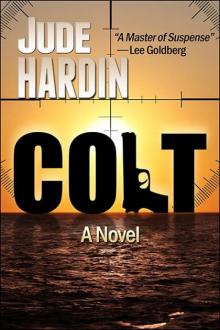 COLT (A Nicholas Colt Thriller)
COLT (A Nicholas Colt Thriller)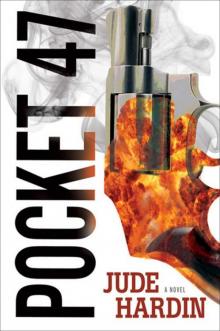 Pocket-47 (A Nicholas Colt Thriller)
Pocket-47 (A Nicholas Colt Thriller) FUSED: iSEAL OMNIBUS EDITION (A Military Technothriller)
FUSED: iSEAL OMNIBUS EDITION (A Military Technothriller) THE JACK REACHER FILES: CHOKE 2 (Episode 2 in the CHOKE Series)
THE JACK REACHER FILES: CHOKE 2 (Episode 2 in the CHOKE Series) Snuff Tag 9 (A Nicholas Colt Thriller Book 3)
Snuff Tag 9 (A Nicholas Colt Thriller Book 3) THE JACK REACHER FILES: HOSTAGE
THE JACK REACHER FILES: HOSTAGE THE JACK REACHER FILES: THE GIRL FROM THE WRONG SIDE OF CORDIAL (with Bonus Thriller THE BLOOD NOTEBOOKS)
THE JACK REACHER FILES: THE GIRL FROM THE WRONG SIDE OF CORDIAL (with Bonus Thriller THE BLOOD NOTEBOOKS) 3 TERRIFYING THRILLERS
3 TERRIFYING THRILLERS The Jack Reacher Files: Fugitive
The Jack Reacher Files: Fugitive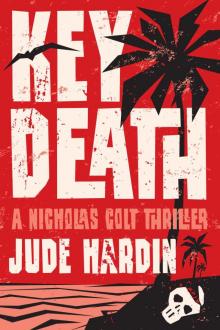 Key Death (A Nicholas Colt Thriller Book 4)
Key Death (A Nicholas Colt Thriller Book 4) SYCAMORE BLUFF (Prequel to THE JACK REACHER FILES: ANNEX 1) (A Nicholas Colt Thriller Book 8)
SYCAMORE BLUFF (Prequel to THE JACK REACHER FILES: ANNEX 1) (A Nicholas Colt Thriller Book 8) VELOCITY
VELOCITY Fire and Ice
Fire and Ice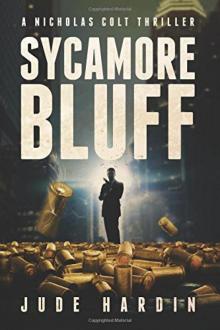 Sycamore Bluff
Sycamore Bluff Jack Reacher Files_Velocity
Jack Reacher Files_Velocity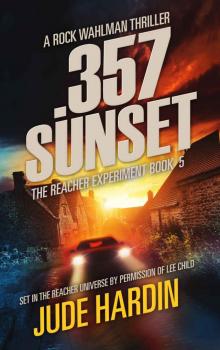 357 Sunset
357 Sunset THE JACK REACHER FILES: CHOKE (Episode 1 in the CHOKE Series)
THE JACK REACHER FILES: CHOKE (Episode 1 in the CHOKE Series)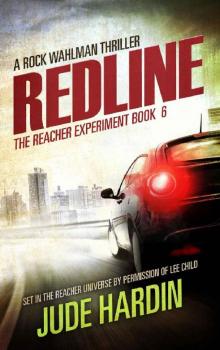 Redline: The Reacher Experiment Book 6 (The Jack Reacher Experiment)
Redline: The Reacher Experiment Book 6 (The Jack Reacher Experiment) Fugitive
Fugitive Fire and ice dm-8
Fire and ice dm-8 American PI
American PI THE JACK REACHER FILES: ANNEX 1 (A Novel of Suspense)
THE JACK REACHER FILES: ANNEX 1 (A Novel of Suspense) THE JACK REACHER FILES: VELOCITY (with bonus thriller CROSSCUT)
THE JACK REACHER FILES: VELOCITY (with bonus thriller CROSSCUT) The Reacher Experiment
The Reacher Experiment Hostage
Hostage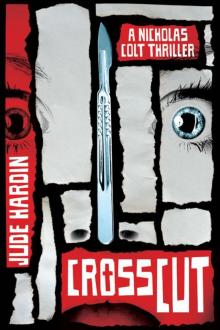 Crosscut (A Nicholas Colt Thriller Book 2)
Crosscut (A Nicholas Colt Thriller Book 2) Lady 52: A Jack Daniels/Nicholas Colt Novel
Lady 52: A Jack Daniels/Nicholas Colt Novel